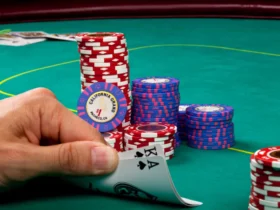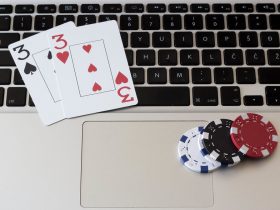Poker is far more than just a card game played for money or entertainment. It’s a test of human psychology, risk management, and analytical thinking. Whether you’re sitting in a glamorous Las Vegas casino or joining an online table from home, poker remains one of the most intellectually demanding and psychologically thrilling games ever created. Understanding poker deeply involves grasping its strategies, probability calculations, and emotional intelligence.
Understanding the Core of Poker
Poker is a family of card games that combines strategy, skill, and chance. Players wager based on the value of their hand, and the goal is to win chips or money either by having the best hand or convincing others to fold. What separates poker from other gambling games is that it’s not purely about luck. Success is largely dependent on a player’s ability to make informed decisions and read their opponents.
The Objective of Poker
The central objective in poker is simple: win as many chips or money as possible over the long term. But achieving that goal involves:
- Making decisions based on mathematical probability
- Managing risk effectively
- Reading the body language and betting patterns of other players
- Remaining emotionally stable under pressure
Poker’s allure lies in this delicate balance between logic and psychology.
Popular Variants of Poker
Poker comes in multiple variations, each with distinct rules, betting structures, and strategies. However, several key versions dominate both professional and casual play.
Texas Hold’em
Texas Hold’em is the most popular and widely recognized poker variant in the world. Each player is dealt two private cards, and five community cards are placed on the table. The aim is to make the best possible five-card hand using any combination of these seven cards.
Key features include:
- Two hole cards and five community cards
- Four betting rounds: pre-flop, flop, turn, and river
- Strategic bluffing opportunities based on opponent tendencies
Omaha
Omaha poker is similar to Texas Hold’em but with a crucial twist: players receive four hole cards instead of two. They must use exactly two of their hole cards and three of the community cards to form their hand. This variant demands stronger mathematical and positional awareness.
Seven-Card Stud
Before community card games took over, Seven-Card Stud was the most popular poker variant. Players receive seven cards, three face-down and four face-up, and must build the best five-card hand. The absence of community cards makes bluffing and memory more critical.
Draw Poker
Draw Poker is one of the oldest forms of the game. Each player receives a complete hand before the first round of betting and can exchange a set number of cards to improve their hand. This variant rewards players who can disguise their intentions effectively.
Poker Hand Rankings
Understanding hand rankings is fundamental to mastering poker. From strongest to weakest, the standard hand hierarchy is:
- Royal Flush – A, K, Q, J, 10 of the same suit
- Straight Flush – Five consecutive cards of the same suit
- Four of a Kind – Four cards of the same rank
- Full House – Three of a kind plus a pair
- Flush – Five cards of the same suit, not in sequence
- Straight – Five consecutive cards of mixed suits
- Three of a Kind – Three cards of the same rank
- Two Pair – Two different pairs
- One Pair – Two cards of the same rank
- High Card – The highest single card when no other hand is made
Memorizing these rankings ensures you can quickly assess the strength of your hand during play.
The Science Behind Poker Strategy
What makes poker so intellectually rich is that it merges game theory, probability, and human psychology. Players must constantly evaluate odds, expected value, and risk.
Understanding Expected Value (EV)
Every decision in poker has an expected value, which represents the average outcome if that same decision were made countless times.
- A positive EV decision yields profit over time.
- A negative EV decision leads to losses.
Skilled poker players consistently make positive EV decisions, regardless of short-term outcomes.
Position and Its Importance
Your position at the poker table dictates how much information you have before acting. The later your position, the more data you have about opponents’ decisions. Acting last provides a tremendous strategic edge.
Bluffing and Psychological Warfare
Bluffing is an art that transforms poker from a mathematical exercise into a psychological duel. Effective bluffing requires understanding opponents’ tendencies and timing. Bluffing too often can make you predictable, while never bluffing limits your potential gains.
The best players use semi-bluffs, where they have a drawing hand that might still win if called. This minimizes risk while maintaining pressure.
The Mathematics of Poker
Poker is a probabilistic game at its core. Successful players rely on numbers as much as intuition.
Pot Odds
Pot odds represent the ratio between the size of the pot and the cost of a contemplated call. If the pot offers better odds than your hand’s probability of winning, calling is profitable.
For example:
If the pot is $100 and you must call $20 to continue, your pot odds are 5:1. If your chance of winning is greater than 16.6%, the call is mathematically correct.
Implied Odds
Implied odds consider the future winnings if your hand improves. This concept is vital in speculative situations, such as drawing for straights or flushes.
Probability and Combinatorics
Advanced players often calculate the number of card combinations that beat or lose to their hand. This helps refine betting decisions and bluffing frequency.
Emotional Intelligence in Poker
While probability and strategy form the backbone of poker, emotional control determines who truly succeeds.
Managing Tilt
Tilt is a state of emotional frustration that leads to poor decisions. Avoiding tilt requires mindfulness, discipline, and detachment from short-term outcomes.
Reading Opponents
Professional players analyze:
- Betting patterns to detect strength or weakness
- Physical tells like breathing rate or eye movement in live games
- Timing and frequency of bets in online games
Emotional intelligence allows a player to adjust strategies dynamically, exploiting opponents’ weaknesses effectively.
Bankroll Management
Bankroll management is one of the most overlooked yet crucial elements of long-term poker success. Even the most skilled players face losing streaks due to variance.
Key bankroll principles include:
- Never risk more than 5% of your total bankroll in a single session
- Set clear limits for buy-ins and losses
- Treat poker funds as an investment, not expendable cash
Following these rules prevents emotional decisions that can devastate finances.
The Role of Technology in Modern Poker
Today’s poker environment is shaped by data analytics, tracking software, and online platforms. Players can now review hand histories, analyze tendencies, and practice using simulations.
AI-driven tools and solvers have introduced Game Theory Optimal (GTO) play, offering balanced strategies that minimize exploitability. However, human creativity and adaptability still reign supreme when reading real opponents.
Building a Winning Poker Mindset
Mastering poker is a journey that requires a balanced mindset, discipline, and lifelong learning. A strong poker mindset involves:
- Accepting variance and focusing on long-term results
- Continuously studying strategy and reviewing sessions
- Maintaining mental clarity through rest, nutrition, and mindfulness
A winning poker player doesn’t just play cards—they play people, numbers, and emotions all at once.
Common Mistakes to Avoid
Even seasoned players can fall into traps that limit their growth. Some frequent mistakes include:
- Playing too many hands out of boredom
- Overvaluing marginal hands
- Ignoring position
- Failing to adapt to opponent behavior
- Chasing losses after bad beats
Correcting these habits instantly elevates your performance.
Frequently Asked Questions
Q1: Is poker a game of luck or skill?
Poker is a combination of both. In the short term, luck can influence outcomes, but over time, skill and strategy determine consistent success.
Q2: How long does it take to become a professional poker player?
It depends on dedication and study. Most professionals spend years mastering theory, emotional control, and bankroll discipline.
Q3: Can poker be learned without gambling real money?
Yes. Many platforms and apps offer free play or low-stakes games that allow you to practice strategy without financial risk.
Q4: What’s the biggest psychological challenge in poker?
Managing emotions during losing streaks and avoiding tilt are the most challenging aspects.
Q5: Are online poker strategies different from live poker?
Online poker emphasizes data analysis and timing patterns, while live poker relies heavily on reading physical tells and human behavior.
Q6: How can beginners start improving fast?
Start by mastering basic hand rankings, studying pot odds, and focusing on tight-aggressive play. Reviewing your sessions afterward is key to steady improvement.











